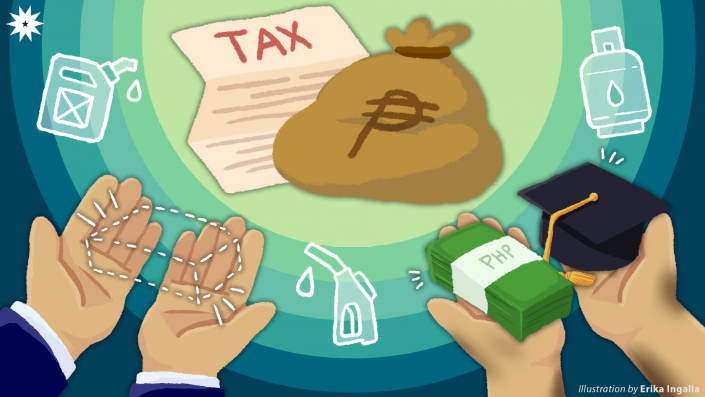The past few months were a wild ride for gas prices—both gasoline and diesel had reached rates of as much as P60 per liter, families and small businesses had to adjust their budgets as liquefied petroleum gas (LPG) tanks became more expensive, and transportation prices grew by 7.1 percent in October versus the 5.2 percent the month before.
As a net importer, the Philippine oil industry is under the mercy of the global oil market. It seems Filipino policymakers can only do so little to control fuel prices other than react to it. That is why in November, the Ways and Means Committee of the House of Representatives passed a proposed suspension of fuel excise taxes under the Tax Reform for Acceleration and Inclusion Law. An approval would be good news for many, mostly because it’s easier to simply shave P10 off of gasoline and watch its price go down visibly. But while well-intentioned, the move is shortsighted at best.

The Department of Finance (DOF) prefers to say “inequitable” and for good reason. Significantly reducing gas prices by as much as P10 per liter may relieve a large portion of the expenses of public vehicle drivers and LPG users. Poor families will enjoy government aid directly through tax cuts—but just as much as the wealthy will, who drive private cars and luxury vehicles. Putting it another way, cutting excise taxes altogether will subsidize both the poor and the rich.
There’s no point paying for those who can afford to do so. Instead, it is better to directly support the drivers and families struggling from expensive fuel. The idea applies to virtually every other good. Give away targeted scholarships, not free education for everyone. Give ayuda to those who are struggling to meet their basic needs; do not include those who are fine without it. Cutting taxes for everyone wastes potential revenue from the well-off that could instead be spent on assisting the poor.
In October, the government had pledged to release P1-billion handouts in cash to drivers of public utility jeepneys (PUJs). However, this doesn’t cover other public vehicles and will benefit only 178,000 of PUJs, which makes it all the more important that we have the budget for the rest of the affected groups and for future price hikes.
Objections over “foregone government revenues”—coming from the government itself—may sound unpleasant because it arouses concerns over corruption. It is, of course, justified that people are worried about their taxes going to the wrong hands or being spent on unnecessary road repairs. But that does not mean that the solution is to scrap taxes altogether when the problem is corruption itself. That is like throwing out stained clothes instead of washing them.
Interestingly, Sen. Grace Poe pointed out that under the Corporate Recovery and Tax Incentives for Enterprises (CREATE) Law, the government stands to lose P251 billion in corporate income tax cuts. That is well over the P131 billion that DOF is unwilling to forego for poor drivers. As unfair as it sounds, such a preference is simply due to different taxes serving different purposes.
Excise taxes are priced directly on specific goods that need discouraging consumption such as dirty fossil fuels. Additionally, they are imposed on commodities that people will still be willing to pay for despite price hikes because they lack alternatives. Such is the case for oil, making it a stable source of tax revenue than, say, clothes.
When done right, the negative impacts of an excise tax can be limited to a simple price increase. On the other hand, higher corporate income taxes can trigger wider domino effects by prompting companies to reduce wages and lay off workers. It also discourages investment, ultimately impeding economic growth. The CREATE law attempts to address this by creating a balance between government revenue and the effects of having some of the highest income tax rates in Southeast Asia.
Thus, it is better to keep the P131 billion from excise taxes than the P251 billion from companies. As established previously, the government had already allotted P1 billion for fuel subsidies—a tiny fraction of the total tax revenue. Surely, the government could stand to lose just a few more billion pesos in discounts for public vehicle drivers and cash grants for LPG and kerosene users, rather than over a hundred billion to a fair and square tax cut.
The point of taxes is for the government to spend it on making taxpayers’ lives better. House Deputy Majority Leader and Quezon City Rep. Jesus Suntay maintained that the proposed suspension would be their “Christmas gift to the Filipino people who have been hit hard by this pandemic.” As a Filipino asking for a gift from my legislators, I’d rather see a wholesome use of the budget we all pay for.
